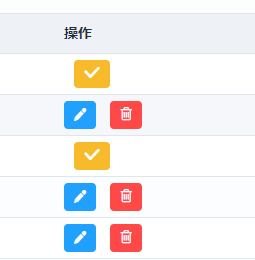el-table中操作一栏怎么根据当前行的信息显示编辑、删除、编辑完成按钮
对每个按钮是否显示,使用v-show绑定变量,因为每一行的v-show绑定的变量必须是唯一的(不然的话操作此行,其他行的状态也会跟着变化),所以不可能提前在.ts中对变量进行初始化,只能使用本行的字段进行v-show绑定。
加入本行的数据为scope.row,其数据格式为
{ "propertyId": 4, "propertyName": "标题", "propertyType": 0 },
如果这里v-show=“scope.row.edit”,因为scope.row本来没有edit这个字段,当在.ts中改变edit值时,不能立刻反应在view中。所以只能绑定scope.row已存在的字段,但是又出现一个问题,改变绑定的字段时数据的变化会反应在表格数据上。
最后解决办法:绑定scope.row.propertyId,不改变其值,改变其类型,根据其类型设置按钮是否显示。
效果:

.vue中:
<el-table-column label="操作"> <template scope="scope"> <el-button size="small" type="primary" icon="edit" @click="handleEdit(scope.$index, scope.row)" v-show="typeof(scope.row.propertyId)=='number'"></el-button> <el-button size="small" type="danger" icon="delete2" @click="handleDelete(scope.$index, props.row.properties)" v-show="typeof(scope.row.propertyId)=='number'"></el-button> <el-button size="small" type="warning" icon="check" @click="handleEditOk(scope.$index, scope.row)" v-show="typeof(scope.row.propertyId)!=='number'"></el-button> </template> </el-table-column>
.ts中:
handleEdit(index, rowData) { rowData.propertyId = rowData.propertyId.toString(); } handleDelete(index, tableData) { tableData.splice(index, 1); } handleEditOk(index, rowData) { rowData.propertyId = Number(rowData.propertyId); }
但是,在ts中并不推荐这样使用,因为这样就失去了ts语言类型检测的意义,最终解决办法如下:
在.ts文件中定义一个变量minimum=-9999,并将变量editingPropId初始化为minimum,当点击“编辑”按钮时,this.editingPropId = rowData.propertyId;当点击“编辑完成”按钮时,将this.editingPropId = minimum
.vue中这样控制各个按钮的显示与否:
<el-table-column label="操作"> <template scope="scope"> <el-button size="small" type="primary" icon="edit" @click="handleEdit(scope.row)" v-show="editingPropId !== scope.row.propertyId"> </el-button> <el-button size="small" type="danger" icon="delete2" @click="handleDelete(scope.row)" v-show="editingPropId !== scope.row.propertyId"> </el-button> <el-button size="small" type="warning" icon="check" @click="handleEditOk(scope.row)" v-show="editingPropId === scope.row.propertyId"></el-button> </template> </el-table-column>


